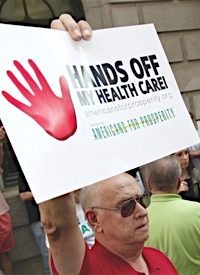
“If you like your healthcare plan, you can keep your healthcare plan,” President Barack Obama said repeatedly during the debate over his healthcare reform bill, hoping to allay fears that the bill, if passed, would force individuals into different health insurance plans or force those plans to change.
Tell that to the Congressional Budget Office (CBO). That nonpartisan agency has just released a report estimating that anywhere from 3 million to a whopping 20 million Americans are likely to lose their employer-based health coverage annually beginning in 2019.
The CBO considered a variety of scenarios with regard to employer-based health insurance. The best-case scenario had just 3 million people losing their coverage each year from 2019 to 2022, while the worst-case scenario had 20 million losing it. (One scenario, however, projected that 3 million more people each year would receive employer-based insurance.) The CBO’s best estimate was that “about 3 million to 5 million fewer people, on net, will obtain coverage through their employer each year … than would have been the case under prior law.”
{modulepos inner_text_ad}
The CBO expects employers to drop insurance coverage primarily for low-wage earners. The penalty for failing to insure employees, after all, is often far lower than the cost of insuring them; and low-wage earners have little bargaining power. In addition, employers will expect those workers to be able to obtain healthcare via Medicaid, the Children’s Health Insurance Program (CHIP), or subsidized insurance on state exchanges — which is true for some but not all of them. In 2019 the CBO projects 11 million people will lose coverage through their employers and another 3 million will drop it voluntarily to obtain subsidized insurance or Medicaid; but it expects 9 million to gain employer-based coverage, meaning that 5 million fewer people will have employer-based health insurance.
Moreover, despite the hype surrounding ObamaCare, it will not by any means solve the problem of individuals’ lacking health insurance. According to the CBO’s best estimate, the Affordable Care Act (ACA) will only insure about half of those who would be uninsured in its absence: “Under the ACA, the number of people without health insurance will fall from between 57 million and 60 million in those years to about 26 million or 27 million.” That, of course, leaves the door open for further intervention — perhaps in the form of universal, government-run healthcare — to take care of those remaining uninsured persons.
While the CBO admitted that “there is clearly a tremendous amount of uncertainty about how employers and employees will respond to the set of opportunities and incentives under ObamaCare, it apparently had enough confidence in its own prognosticative powers to offer forecasts of how many people will lose (or gain) employer-based coverage a decade hence. At the same time, it dismissed various surveys showing that far more employers are likely to drop insurance coverage than the government has estimated because the survey results are “conflicting” (as were the CBO’s various scenarios) and because “it is doubtful that any survey conducted today could provide very accurate predictions of employers’ future decisions.” Apparently, forecasts that bolster, at least to some extent, the government’s agenda are to be believed despite vast uncertainty, while those that conflict with that agenda are not to be trusted because of said uncertainty.
Republicans were only too happy to seize on the inconsistency between the President’s pledge to let people keep their existing health coverage and the CBO’s forecast of millions’ being deprived of their employer-based plans.
“President Obama’s string of empty promises is quickly becoming a disappointing trail of broken promises,” House Budget Committee Chairman Paul Ryan (R-Wis.) said in a March 15 statement. “He promised Americans that his overhaul of the health care sector would not jeopardize the health coverage of those who liked what they had. As nonpartisan analysts made clear today, millions of Americans will soon learn the hard way that Washington’s overreach into their health care decisions will result in sharp disruptions to their coverage and their care.”
This marked the second time in the space of a few days that the CBO had handed the GOP a political advantage with regard to ObamaCare. An earlier report estimated that the law would now cost nearly twice as much as originally forecast — $1.76 trillion as opposed to $938 billion — between now and 2022.
The reason for the increase is that the original 10-year estimate included two years before the law would take effect, during which, naturally, there was little to no spending on it. Now that the estimate begins when ObamaCare begins, there is spending throughout the decade under consideration, making the price tag higher. The fact that that cost doubles when only two more years of spending are included shows just how fast the law is going to become a drag on the federal budget.
In addition, that $1.76 trillion is only the estimated cost of subsidizing insurance coverage. It does not include implementation costs or other charges. Adding those in, Senate Budget Committee ranking member Sen. Jeff Sessions (R-Ala.) told Fox News, would bring the cost to $2.6 trillion over 10 years — which, he noted, was more than the $2.1-trillion deficit-reduction target that Congress set last year.
“The bill spends more than the President promised, it covers fewer people — probably 2 million fewer people — and it taxes more than was expected,” Sessions said.
In other words, it’s just another day in the life of ObamaCare, whose motto seems to be “Promises are made to be broken — and fast!”
Photo: Mike Griffith, of Canton, Ga., holds a sign during a protest against President Barack Obama’s health care reform plan outside the 11th Circuit Court of Appeals in Atlanta, June 8, 2011: AP Images


